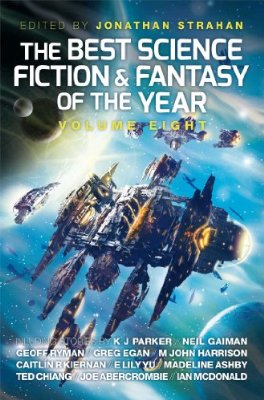Book Review: The Stories of the Raksura Volume Two by Martha Wells

Through three novels and a previous collection of stories (Stories of the Raksura Volume One: The Falling World and The Tale of Indigo and Cloud), Martha Wells has built up an ever richer tapestry of tales of the Three Worlds, focusing primarily on her alien, shapeshifting and yet all too human race of the Raksura. Stories of the Raksura Volume Two: The Dead City and The Dark Earth Below continues in that tradition. Within, Martha gives us the two titular novellas as bookends to the book, and three stories in between. Also like the first volume, Wells gives us a variety of time frames in which the stories are set. Having contented herself with setting up the framework of Moon (our primary POV protagonist) in the three Raksura books (The Cloud Roads, The Serpent Sea and The Siren Depths), rather than always progressing the narrative forward in time, she has taken the tack of telling backstories, and side stories about the characters and the world. One of the stories, as detailed shortly, does not involve the Raksura at all. The richness of the peoples and creatures of the Three Worlds allows for amazing diversity in potential protagonists within and without of the Raksura themselves. The Raksura are her primary and overwhelming interest, and with good reason. However, there is nothing to prevent her from exploring other corners of her world.
Short and Sublime: February 2015 Round-Up
February’s shorts include emotionally resonant stories about family and friendship and trippy genre-benders. “The Language of Knives” by Haralambi Markov (Tor.com) is a secondary world fantasy in which the main character has given up the life of a warrior and chosen to prepare the dead; when he must perform this task for his husband, he mourns not only his lover but also substantially lesser status in the eyes of his daughter. Parents having favorites amongst their children is very much part of our cultural milieu, but not so frequently presented is the reverse, and this is a rendering of complex emotions that feels very true. Gwendolyn Clare’s “Indelible” (Clarkesworld #101) is another such resonant tale of grief, following the loss of one’s sister in a science fictional far future in which aliens are characterized by their physical malleability.
Short and Sublime: January 2015 Round-Up
Short and Sublime is a new column spotlighting great short fiction. January stories include optimistic sci-fi tales, feminist subversions of problematic tropes in fantasy, and creatures from mythologies both real and imagined. Michaëlle-Isabelle, Michaëlle-Isabelle, Don’t get close, or you will smell. Michaëlle-Isabelle, Michaëlle-Isabelle, Here she comes, go run and tell. Michaëlle-Isabelle, Michaëlle-Isabelle, Her mama casts them voodoo spells. Michaëlle-Isabelle, Michaëlle-Isabelle, Take your Haitian tail to Hell!
Book Review: The Best Fantasy and Science Fiction of the Year, Volume 8

While not quite Dozois-sized in the number of stories and pages it contains, The Best Fantasy and Science Fiction of the Year Volume 8 edited by Jonathan Strahan does have one major advantage over its counterpart. Strahan, unlike Gardner Dozois’s own yearly tomes, boldly mixes both science fiction and fantasy into one volume, rather than trying to figure out what belongs in Science Fiction and what is firmly in the domain of fantasy. Eight volumes in, Strahan’s editorial voice in selecting the best of the year from both SF and fantasy together is distinctive and strong. The stories are:
Thoughts on the Hugo Nominated Short Stories by Adam Callaway

(Edit: this post was actually written by Adam Callaway. I forgot that WordPress would use my ID to indicate the author if I was the one who created it. Sorry for any confusion.) I am both pleasantly surprised and just a little disappointed with this year’s batch of nominees. There were no short stories I found to be of poor quality. In my opinion, there was one mediocre story, two good ones, and one very good one. I wish there had been a full ballot of short stories to read through. I also wish there had been more diversity in terms of theme and content. In the end, I feel like these are incredibly mature stories that show the changing face of speculative literature in the 21st century. In many ways, they share more in common with fiction published in the New Yorker than Amazing Stories. Instead of ray guns and magic swords, you have metafiction and magical realism. Regardless of the quality of these stories, this is a Good Thing for the future of the genre. But are these really the best stories genre produced last year? Hmm… Here are my brief thoughts on each of the nominees:

